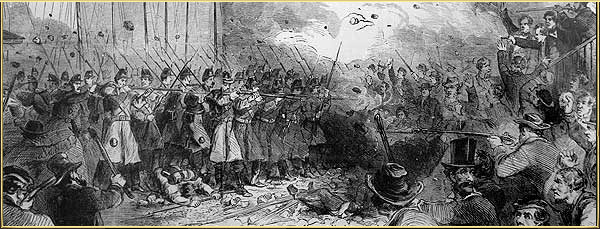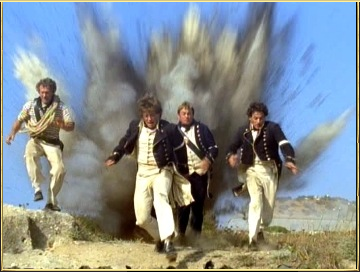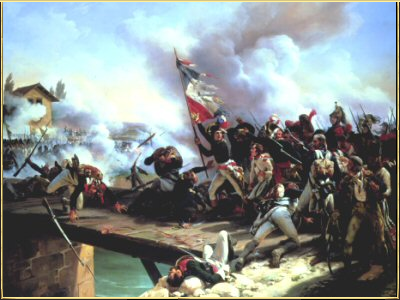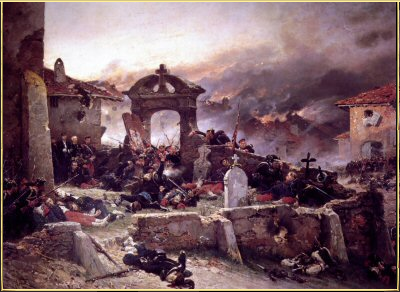To All: Right, ok, I know I said I would be slowing down, but I want to take a break from revising this weekend but have not enough time to write a Narrative update, so I guess it will have to be this one... oh well... could be worse. I need to just go and do some History revision and then will be back as soon as possible to write this. But first, feedback.
Enewald: To get Germany on our side, first, was our priority. Once we have time to ourselves, the Princes can be broken one by one. Patience is needed my friend.
coz1: 'Tis a wise saying, and one that I shall hold true to. Those men have a use. The French, I am worried, will throw division after division at me, so fighting a defensive war, especially when I have a serious lack of troops available on the front line is to my advantage, as well as the more far-sighted (and pure roleplay for now) associations that Bismarck made for not taking Paris now.
Eöl: I would like to have a large period of peace, and I think, to a great extent, Europe will grant it too me after I have beaten France. However, I cannot say how America will react to me. Events in America, I am quite sure, will be more important to me in the next few years than ever before.
ComradeOm: Thanks, I doubt Britain will make a return to the continent, but you will see a much greater agression between Britain and Germany in the coming years. Britain has become the real Bismarck's Russia, but I do not think I will be able to tame this beast like he did Russia. This makes for even more reason for me to get Russia back on my side to keep safe against Britain. I'm tangling with a super-power with an intrinsicly weak state... I need allies and big ones.
geek_kinght: Like I said, Britain didn't expect anything to the extent of what has happened in Germany, and the war with France is not helping relations between Germany and Britain. We will have to wait and see what it comes to in the end...
comagoosie: Indeed it did have the manpower, but I wanted to show just how laterally Bismarck was thinking, as a pose to the quite one-track-mindedness of the Generals in taking to the offensive and winning the war. Attacking Denamrk certainly had the better of the argument though, and mainly because of Bismarck.
phargle: A joke it may be, but it may become a serious threat. I have a navy yes... the Prussian navy consists of 4 clipper transports and the German navy now consists of 5 clippers and a frigate. That can't stand up to Denmark's navy of 14 vessels of war. You are correct though, a defensive campaign against France would be to my advantage, and I intend to use that, but I can't let them take foot holds in Germany... the union would fall apart if we showed weakness to the age old enemies. The Dukes might decide that perhaps Germany isn't such a great idea if I fail. It can't be left to chance. The situation in Germany is quite dire. War exhaustion is at 9% and I am getting a couple of revolts. It is hardly nation threatening though. The fate of the war, I think, rests on if the British get involved or not, but it is purely speculative.
Ahura Mazda: Aims are slim, along the lines of the gentleman peaces I have scored over the past few years. Schleswig will be the main candidate for annextion into the German Empire, though I have eyes set else where as well if possible.
JosunUrashima: I want Denmark to stop being an annoyance on my flank and an offensive there should yield good gains for small loss, so it seems the logical choice rather than leaving it to be a parasite on the french front. Like I said before, American events will be leading much of my policy, I would suspect, in the post-franco-war era, but I can't say for certain. I have to let America come to me, rather than the other way around, to stop the British getting up my back.
Enewald: To get Germany on our side, first, was our priority. Once we have time to ourselves, the Princes can be broken one by one. Patience is needed my friend.
coz1: 'Tis a wise saying, and one that I shall hold true to. Those men have a use. The French, I am worried, will throw division after division at me, so fighting a defensive war, especially when I have a serious lack of troops available on the front line is to my advantage, as well as the more far-sighted (and pure roleplay for now) associations that Bismarck made for not taking Paris now.
Eöl: I would like to have a large period of peace, and I think, to a great extent, Europe will grant it too me after I have beaten France. However, I cannot say how America will react to me. Events in America, I am quite sure, will be more important to me in the next few years than ever before.
ComradeOm: Thanks, I doubt Britain will make a return to the continent, but you will see a much greater agression between Britain and Germany in the coming years. Britain has become the real Bismarck's Russia, but I do not think I will be able to tame this beast like he did Russia. This makes for even more reason for me to get Russia back on my side to keep safe against Britain. I'm tangling with a super-power with an intrinsicly weak state... I need allies and big ones.
geek_kinght: Like I said, Britain didn't expect anything to the extent of what has happened in Germany, and the war with France is not helping relations between Germany and Britain. We will have to wait and see what it comes to in the end...
comagoosie: Indeed it did have the manpower, but I wanted to show just how laterally Bismarck was thinking, as a pose to the quite one-track-mindedness of the Generals in taking to the offensive and winning the war. Attacking Denamrk certainly had the better of the argument though, and mainly because of Bismarck.
phargle: A joke it may be, but it may become a serious threat. I have a navy yes... the Prussian navy consists of 4 clipper transports and the German navy now consists of 5 clippers and a frigate. That can't stand up to Denmark's navy of 14 vessels of war. You are correct though, a defensive campaign against France would be to my advantage, and I intend to use that, but I can't let them take foot holds in Germany... the union would fall apart if we showed weakness to the age old enemies. The Dukes might decide that perhaps Germany isn't such a great idea if I fail. It can't be left to chance. The situation in Germany is quite dire. War exhaustion is at 9% and I am getting a couple of revolts. It is hardly nation threatening though. The fate of the war, I think, rests on if the British get involved or not, but it is purely speculative.
Ahura Mazda: Aims are slim, along the lines of the gentleman peaces I have scored over the past few years. Schleswig will be the main candidate for annextion into the German Empire, though I have eyes set else where as well if possible.
JosunUrashima: I want Denmark to stop being an annoyance on my flank and an offensive there should yield good gains for small loss, so it seems the logical choice rather than leaving it to be a parasite on the french front. Like I said before, American events will be leading much of my policy, I would suspect, in the post-franco-war era, but I can't say for certain. I have to let America come to me, rather than the other way around, to stop the British getting up my back.
Last edited:





